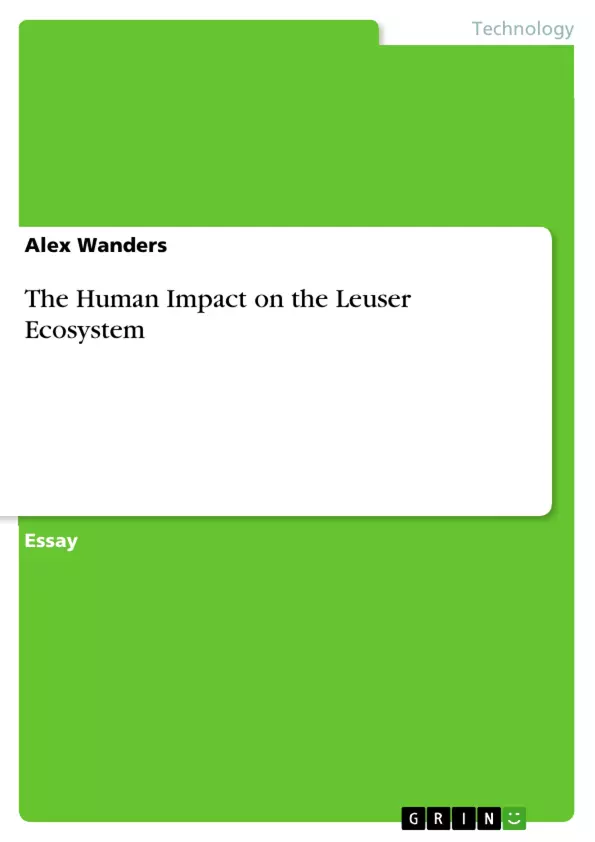The essay examines the human impact on the Leuser ecosystem in Northern Sumatra, Indonesia, a critical rainforest ecosystem known for its biodiversity, including endangered species like Sumatran orangutans, tigers, elephants, and rhinos. It discusses environmental, economic, and ethical implications of human activities, particularly the effects of palm oil production, deforestation, and poaching.
Inhaltsverzeichnis (Table of Contents)
- The Leuser Ecosystem
- Human Impact on the Leuser Ecosystem
- Environmental Effects
- Economic Effects
Zielsetzung und Themenschwerpunkte (Objectives and Key Themes)
This text aims to explore the multifaceted impact of human activities on the Leuser ecosystem in Northern Sumatra, Indonesia. It examines the environmental consequences, economic implications, and ethical considerations associated with the ongoing destruction of this vital rainforest.
- The biodiversity and ecological significance of the Leuser ecosystem.
- The detrimental effects of palm oil plantations, logging, and poaching.
- The economic benefits and drawbacks of the Indonesian palm oil industry.
- The impact of deforestation on climate change and natural disasters.
- Ethical considerations surrounding the exploitation of the Leuser ecosystem.
Zusammenfassung der Kapitel (Chapter Summaries)
The Leuser Ecosystem: The Leuser ecosystem, located in Northern Sumatra, Indonesia, is a remarkably diverse rainforest supporting a unique assemblage of flora and fauna, including orangutans, elephants, tigers, and rhinos—species found nowhere else together. Its 2.6 million hectares harbor over 130 mammal species, hundreds of bird species, and thousands of plant species. Despite its UNESCO World Heritage status, the ecosystem faces critical endangerment due to deforestation driven by palm oil, timber, and rubber demands, with many species, including orangutans, tigers, elephants, and rhinos, critically endangered.
Human Impact on the Leuser Ecosystem: This section delves into the profound environmental and economic consequences of human intervention in the Leuser ecosystem. The environmental impact is primarily driven by rampant deforestation for palm oil plantations, leading to habitat loss and the endangerment of numerous species, with the orangutan, a keystone species, particularly vulnerable. Illegal logging exacerbates the problem. Poaching further threatens already endangered populations. The economic ramifications are complex, with palm oil contributing significantly to Indonesia's exports and employment but simultaneously fueling deforestation and climate change. This creates a devastating cycle, where economic gains come at the expense of environmental stability and societal well-being, ultimately impacting the lives and safety of the Indonesian people.
Schlüsselwörter (Keywords)
Leuser ecosystem, deforestation, palm oil, biodiversity, orangutan, Sumatran tiger, Sumatran elephant, Sumatran rhino, poaching, illegal logging, climate change, economic impact, environmental consequences, keystone species, Indonesia.
Häufig gestellte Fragen (Frequently Asked Questions)
Was ist das Leuser-Ökosystem?
Das Leuser-Ökosystem ist ein Regenwald in Nordsumatra, Indonesien, der für seine außergewöhnliche Artenvielfalt bekannt ist. Es beherbergt eine einzigartige Zusammenstellung von Flora und Fauna, darunter Orang-Utans, Elefanten, Tiger und Nashörner, die sonst nirgendwo gemeinsam vorkommen.
Welche Hauptbedrohungen gefährden das Leuser-Ökosystem?
Die Hauptbedrohungen sind Abholzung durch Palmölplantagen, Holzfällerarbeiten, die Nachfrage nach Kautschuk sowie Wilderei.
Welche Umweltauswirkungen hat die menschliche Aktivität auf das Leuser-Ökosystem?
Die Umweltauswirkungen umfassen den Verlust von Lebensräumen, die Gefährdung zahlreicher Arten (insbesondere des Orang-Utans), illegale Abholzung und die Zunahme der Wilderei.
Welche wirtschaftlichen Auswirkungen hat die Palmölindustrie in Indonesien?
Die Palmölindustrie trägt erheblich zu Indonesiens Exporten und Beschäftigung bei. Gleichzeitig fördert sie jedoch die Abholzung und den Klimawandel.
Welche Tiere sind im Leuser-Ökosystem besonders gefährdet?
Orang-Utans, Sumatratiger, Sumatraelefanten und Sumatranashörner sind besonders gefährdet.
Warum ist das Leuser-Ökosystem so wichtig?
Es ist wichtig aufgrund seiner hohen Biodiversität, seiner ökologischen Bedeutung und seiner Rolle als Lebensraum für bedrohte Tierarten. Es spielt zudem eine Rolle bei der Bekämpfung des Klimawandels.
Was sind die wichtigsten Themen in diesem Text?
Die biologische Vielfalt und ökologische Bedeutung des Leuser-Ökosystems, die schädlichen Auswirkungen von Palmölplantagen, Holzfällerei und Wilderei, die wirtschaftlichen Vor- und Nachteile der indonesischen Palmölindustrie, die Auswirkungen der Entwaldung auf den Klimawandel und Naturkatastrophen sowie ethische Überlegungen zur Ausbeutung des Leuser-Ökosystems.
Was sind die wichtigsten Schlüsselwörter im Zusammenhang mit dem Leuser-Ökosystem?
Leuser-Ökosystem, Entwaldung, Palmöl, Artenvielfalt, Orang-Utan, Sumatra-Tiger, Sumatra-Elefant, Sumatra-Nashorn, Wilderei, illegale Abholzung, Klimawandel, wirtschaftliche Auswirkungen, Umweltfolgen, Schlüsselart, Indonesien.
- Arbeit zitieren
- Alex Wanders (Autor:in), 2023, The Human Impact on the Leuser Ecosystem, München, GRIN Verlag, https://www.hausarbeiten.de/document/1520324


